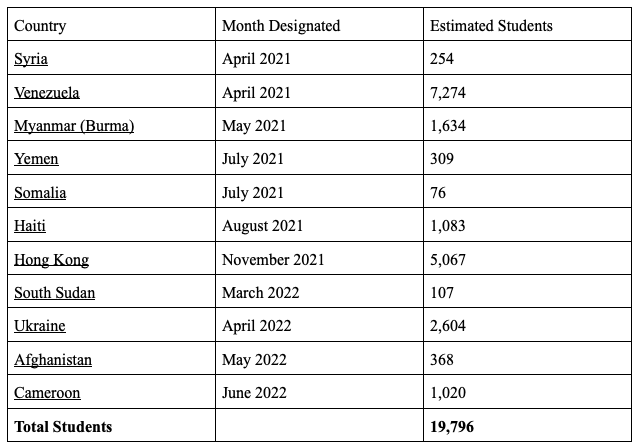Special Student Relief (SSR), a narrow regulatory designation made by the Department of Homeland Security (DHS), provides academic flexibility and work opportunities for international students whose home countries are facing perilous situations. In the past, individual countries received designations intermittently and infrequently: Haiti in 2010, Libya in 2011, and Syria in 2012. The Biden administration, however, has designated 11 countries for SSR status in its first 18 months. Syria, for example, was again designated for SSR in 2021 because DHS determined there was sufficient economic hardship to re-introduce protections.
As of July 2022, nearly 20,000 F-1 student visa holders are from SSR-designated countries. The table below shows SSR designations by country over the last year and a half.
Special Student Relief designations from the Biden administration

Prior administrations and the wider immigration advocacy community have not traditionally paid much attention to SSR. The Biden administration’s reliance on the program is one of its more innovative policy actions and has received very little, if any, pushback thus far. While the scope of these designations is narrow, DHS is clearly concerned with international students carrying on their regular course loads while their home countries face turmoil. By offering flexibility to 20,000 students so far, the administration hopes to spare international students from violating their status during challenging circumstances.
Before the Russian invasion of Ukraine, more than 177 groups — co-led by the Niskanen Center — called for the administration to designate Ukraine for SSR, which it did in April. It was the first time such an extensive coalition effort sought SSR’s inclusion in a request for humanitarian protections for nationals of a country facing an emergency.
The standard policy maneuver for DHS is to rely solely on Temporary Protected Status, or TPS. DHS can offer TPS to foreign nationals to prevent them from having to return to countries in dangerous crises. More than 350,000 foreign nationals are currently protected by TPS, with the Biden administration recently adding Ukraine, Afghanistan, Cameroon, Burma, Venezuela, and South Sudan.
The criteria for receiving SSR and TPS are strikingly similar. For example, my colleagues at Niskanen have pointed out that the “emergent circumstances” necessary to qualify for SSR are nearly the same as the armed conflict or natural or economic disaster criteria for TPS and have called for the designations to be made simultaneously. Both designations are important because while TPS allows foreign nationals to stay in the U.S., it does not provide the same academic flexibility or employment opportunities as SSR.
The Biden administration now seems to grant SSR and TPS as a single package but has not retroactively issued SSR to all countries with TPS. In the last year and a half, TPS and SSR designations have arrived in the Federal Register concurrently for Burma, Cameroon, Afghanistan, and Ukraine. But some TPS populations still have not yet been offered SSR, including El Salvador, Honduras, Nepal, and Nicaragua.
The Biden administration’s unique use of SSR showcases one area where officials use their legal authorities to tailor relief to vulnerable populations.They should continue to issue SSR to nationals who need academic and employment flexibility, but they should seek to tie SSR and TPS retroactively. They have broad authority regarding TPS and SSR, and no congressional intervention is needed for them to issue new designations.
SSR protects legal immigrants vetted and accepted to U.S. institutions of higher learning who now have to deal with an emergency at home while abroad. It’s entirely within the legal purview of DHS to issue these designations, and they should continue to do so generously.
The administration’s use of SSR is something to continue monitoring in the face of many worsening conflicts around the globe today. While DHS should review country conditions of new conflicts, it should also retroactively issue SSR to TPS-designation countries where conflicts and emergencies remain.
Photo credit: iStock